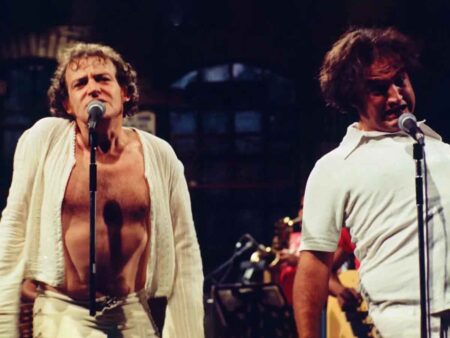In the late 1960s, when the world of pop was shifting rapidly between psychedelic experimentation and protest anthems, Gary Puckett’s voice cut through with clarity, drama, and heart. Leading the Union Gap with military-style precision and operatic intensity, Puckett brought an emotional weight to Top 40 radio that made songs like “Young Girl” and “Woman, Woman” instant classics—and unforgettable.
Today, Gary Puckett is often remembered as one of the strongest vocalists of the era, his baritone delivery as unmistakable as the Civil War uniforms that became the band’s trademark. His music bridged pop, rock, and country influences at a time when few dared to straddle genres. Though his time at the top was relatively brief, his voice has lingered for decades.
Contents
Born to Sing
Gary Puckett was born on October 17, 1942, in Hibbing, Minnesota—the same hometown as Bob Dylan, another musical icon of the decade. Puckett’s family moved west during his youth, and he eventually landed in San Diego, where he attended college and played in several local bands. By the early ’60s, he had begun assembling the group that would soon become known as the Union Gap.
Named after the town of Union Gap, Washington, the band distinguished itself not only through its sound but also its look. Dressed in Civil War-style Union Army uniforms, the group made a visual statement that helped them stand out during the visual explosion of the ’60s. But beneath the costumes, it was Puckett’s voice—a powerful, commanding tenor—that truly caught listeners’ attention.
A Run of Timeless Hits
The band’s first major hit came in 1967 with “Woman, Woman,” a dramatic ballad built around suspicion and emotional vulnerability. Its success was swift, reaching No. 4 on the Billboard Hot 100 and setting the tone for what would be a string of hits over the next two years.
“Young Girl,” released in 1968, became their signature song, despite (or perhaps because of) its controversial subject matter. Built on a soaring arrangement and Puckett’s anguished vocal performance, the track went all the way to No. 2 in the U.S. and topped charts in the UK. It was a moment of pop melodrama executed with uncommon finesse.
Other hits followed: “Lady Willpower,” “Over You,” and “This Girl Is a Woman Now” each carried the same hallmarks—lush orchestration, dynamic crescendos, and Puckett’s unmistakable voice delivering lyrics that mixed romantic turmoil with a theatrical flair.
By the end of the decade, the band had sold millions of records and become regulars on television and in teen magazines. Puckett’s vocal style was often likened to a young Elvis Presley, but with a broader emotional range and a more polished pop sensibility.
A Brief Moment in the Spotlight
As quickly as it rose, the Union Gap’s success began to fade. By the early 1970s, the original lineup had fractured, and the band dissolved. The changing musical landscape—now dominated by hard rock, singer-songwriters, and early disco—left less room for the dramatic, orchestrated ballads that had defined their sound.
Still, Puckett carried on as a solo artist. Though his chart presence dwindled, he remained active as a performer, touring regularly and maintaining a devoted fan base. His concerts became celebrations of the golden age of pop, where fans could hear the songs that had defined their youth sung by the man who originally made them famous.
More Than Nostalgia
What sets Gary Puckett apart isn’t just nostalgia—it’s the undeniable vocal power and emotional conviction he brought to every song. His best work wasn’t just catchy; it was cinematic. Songs like “Lady Willpower” didn’t just ask questions of love—they pleaded, mourned, soared.
And for many fans, those songs served as the soundtrack to real moments: first heartbreaks, long drives, summer dances, or quiet evenings with a transistor radio.
In the decades since his chart-topping years, Puckett has been honored for his contributions to pop music. He’s performed on oldies tours and nostalgia cruises, appeared on numerous television retrospectives, and been covered by artists who admire his emotive vocal delivery.
Even today, when songs like “Young Girl” play on the radio, they’re instantly recognizable—not just for their melodies, but for the unmistakable ache in Puckett’s voice.
Still Singing, Still Standing
Now in his 80s, Gary Puckett continues to perform and connect with fans, often on retro concert bills alongside other stars of the ’60s and ’70s. His voice, though weathered with time, retains much of the rich character that made him famous.
Unlike many of his contemporaries, Puckett never became a headline-grabbing celebrity. He simply sang his heart out—and for a few formative years in the late ’60s, that was exactly what the world wanted.




